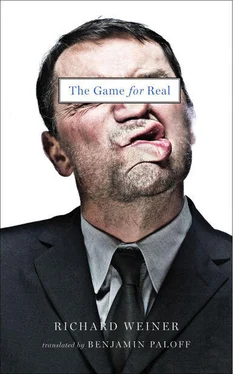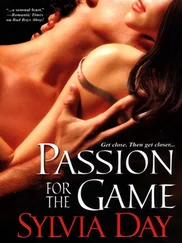“Ah,” they uttered when he headed toward their table, which, feigning nearsightedness, he had recognized when he’d barely come in.
The café was skimping: the lights only went on at the signal of the girl at the register, and the exasperated girl at the register, hounded by the protests of the readers of yesterday’s newspapers, was giving the signal, as they’d really gotten into her hair. — There were seven electric switches; the manager, pivoting methodically from one to the next, was unknowingly opening seven successive heavens. He was coming in only with the messy entrance of the seventh heaven’s forgetful pathos. — Aperitifs, hardwired to the finest coils of the rheostats of the central office for the production of Paris’s “happy hour” fever, glowed slowly from red to white: the café babble flowed like the red from the electric furnaces. The esoteric sense of the furious evening palaver shimmered over the heated trickles of words. It was moseying unobtrusively to and fro, without anyone paying it particular attention: a nonchalant, spherical flash to which they’d become accustomed, and which is effusive without inflicting harm. But from thinking of the not-so-likely possibility that it might pounce after all, and of what might happen afterward, heat was radiating and kindling the room to an infectious and unfounded enthusiasm. The pathological euphoria had deformed the world into untainted beauty, into purpose and order, and to those breathing it in, it indeed seemed a world of untainted beauty, of originary purpose and order. Troubles, difficulties, jealousy, envy, worries, destitution — these went on, but amplified, ennobled, dignified. The wretched microcosms saw themselves in the collective fever’s artful mirror; they saw themselves there in heroic disproportion, and they grew as bold as notaries who’ve overindulged at funeral parties: in mourning coats, which they took for tragic togas. Flying words, sentences, proverbs, witticisms, the gossip spun a net; it was thickening into a more cogent reality than the actuality of those who, in talking, were unwittingly doing the weaving. They were getting tangled in it and growing into a familial form.
“Ah!” they uttered in chorus when they spotted him (and they spotted him immediately in the revolving doors), and they made a little room for him at the table—“ah!”—and they drew him in with their eyes, which were watching like eight examining magistrates. They surrounded him with looks, and those looks were merely the optical extension of the speech they’d only just been conducting about him.
“See who’s. .?”
This “see who’s. .?” in greeting had its own brief story. “See who’s. .?” was an incomplete sentence, which the unsaid “here” fit like Cinderella’s foot into the slipper. He noticed this “here?” What he noticed, that is, was the hand that passed just as though it were swatting a fly, and the fly it was swatting, yes, could be nothing other than a mocking “here,” with a question mark that had, however, unfortunately — or else fortunately — slipped away. Yes, it had latched into the middle of the newcomer’s head like a fishhook. He was caught on the question mark, literally, but it was an extraordinary question mark, for it was a question mark/answer, at which he blushed from his wounded brow downward. And he had been suspicious of himself for so many days already that he was, in his calculatedly chosen attire — the Boulevard Poissonnière had consequences, bad ones, according to the laws that governed them — like a crooked man in a straightening apparatus: convicted by the very thing he’d wanted to use to deceive. The question mark demonstrates to him that he isn’t actually dressed , he’s just funnily dressed up . What are you doing running into the labyrinth, you poor thing, when you can no longer afford a spool of thread?
Ordinary days, like bourgeois-starched Sundays — they constrict him like unweathered shirts.
The mocking “here” with the question mark put him at the level of a doleful subaltern bureaucrat, who, on Sunday night, puts on that cheap finery for which he’d saved up so much, and which again wasn’t helping him. Nor would it help a week later, when he brushes it off again, when he, hoping against hope, puts it on again, again, and again ad infinitum , coming back ad infinitum on Sunday evenings, again and again, each time a little more deluded, but never so hopeless — each time, then, a little funnier — that he’d manage a corrective: “Never again.”
He recognized himself, and, disgusted with himself, he exaggerated his own insignificance with furious and burning delight, until it was like the insignificance of a nameless corpse at the morgue, which not even grief notices. — And no “I’m unhappy” anywhere for him to hide behind. Now that’s fair!
“Over so plucky a tie, one holds his head high!”
Someone had taken him by the chin and pulled him down. Right in front of him: two pressing eyes. Behind the encouraging smile, a malicious curiosity hunkers within them as to how it’s going, and it’s going badly.
“Well, and all the postcard allusions to vacation troubles. .”
He’d come here for a pre-arranged meeting, the first autumn gathering with the gang. With his buddies, with his pals: both those eyes! — These eyes, already feasting in advance on what they didn’t yet know but were already familiar with— this familiarity: how it dances within them — these foreigner’s eyes. How is it that it’s never occurred to him till now that he’s foreign to them? And how is it that he’s not amazed at this unexpected discovery?
He’s appalled by the foxy correspondence between these eyes; with a horror thinned out by the café’s radiant “happy hour” into a kind of noncommittal flirtation — so strained it was breaking — with dread. He sees eyes that are looking him over like those performing a dissection look over their subject: for knowledge and nothing else, but there was something still worse than indifference, there was the shame spun from the certainty (it was a very fine and biting thread of depleted horror that had spun it) that they weren’t looking him over like this for the first time (and he hadn’t known!). That they had never looked at him; that they only ever looked him over. They’d known him for a long time, he who didn’t know them. They knew him better than he’d ever known himself. They’d prepped him with scalpels and tongs, which they availed themselves of remorselessly, and holding nothing back, just where it hurt most, while he only hacked away at himself, within himself, bypassing the painful spots. He had begun hating them, like a failed, faint-hearted experimenter hates an intrepid experimenter, but behind the magnanimous jealousy billowed the mindless malice of the robbed man who has suddenly arrived at the fact that, in his foolhardiness, he’s left everything open for the burglar, even his most secret drawers, and not even out of fear, but out of a raving masochism.
And he who was coming here with a sealed promise that he “would give them a rest with these stories”! He who reads in the foxily imploring eyes that all they care about are his stories! That they don’t care about anything else than the symptoms of “his case”! Their friendship? To his trust, a doctor’s observant “ah, now that’s interesting.” — What advantage does this coalition of four have over him now that he recognizes that he has never been their fifth?
Three sentences: “Oh, see who’s here?” — “Over so plucky a tie. .” — “And all your postcard illusions?” — Three cleverly aimed blows, and beneath each a piece crumbled away from his fateful silence. So what if they then defame him. And the more dilapidated his demolished hideout was, the more eagerly he would oblige them, so that no stone would remain on another. They drew him in among them. It looks like a friendly chat, but it’s a prison escort, cramped and compact as an asylum jerkin. The elbows are wide apart on the table, jovially wide apart, so wide you’d say: grateful listeners of the hunter’s yarn. A trick! Indeed, they are not sitting; they’re above, a conclave, they’re looking down at him. Their eyes were passing through the café, measuredly measuring up this guy, that guy, saying hello, laughing at acquaintances. A trick! To mislead him that they weren’t letting him down, that they were looking after him. Monosyllabic questions, easygoing words: clever investigating judges coaxing a confession. Stay away from these careless hands: that they’re caressing the paper? That they’ve pushed the paperweight aside? A trick! — These are hands lying in wait, setting a trap for you. Absent-minded words, futile questions: they’ve landed, and already it’s as though they’d never been: look out for this synthetically woven net! Here and there, a skimpy burst of laughter; you’d say nothing more than a trickle spurting out because of an oversight, which you’ll stop up with your heel: look out! it’s a pebble calculatedly cast through a little window, into a lookout, into a dormer — like nobody’s business, and the glass rains down: aha! Aha! So that’s where it’s from, that’s where this frosty draft of non-participation is coming from! How it blows! His powerlessness is chilling. He’s trying to warm up, he’s rubbing his hands together, and right away it’s a little warmer, right away this selling of oneself is easier again. — Really, as a matter of fact it’s not so difficult, selling yourself for a hill of beans; being subject to little words, questions, and the rattling rain of laughter right in your face: child’s play! On the contrary, it’s somehow comforting and encouraging, like a pelican’s acts of fatherly love: for what else would these scrawny kids of curiosity do against the brawny athlete, against his usurpation of misfortune, against this misfortune, as basic as rye bread?
Читать дальше












